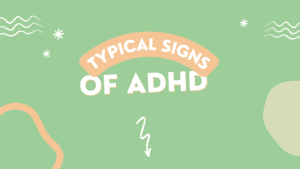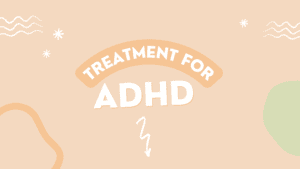What is ADHD?
Attention Deficit Hyperactive Disorder, or ADHD, is a neurological disorder, which impacts around 4.4 percent of adults in the United States. It is more commonly diagnosed in men. In adults, it is characterized by persistent patterns of inattention, hyperactivity, and/or impulsivity, which tends to interfere with the individual’s work/education, relationships, and home life1.

Symptoms of ADHD in Adults
- Inattention
-Poor Attention to Detail
-Forgetfulness
-Difficulty Focusing/Regulating Attention
-Difficulty Getting Started on/Completing Tasks
-Poor Organizational Skills/Time Management - Impulsivity
-Restlessness
-Fidgeting
-Interrupting Others Often
-Excessive Talking - Emotional Dysregulation
- Low Frustration Tolerance2.
It is normal to see some of these symptoms and recognize them in yourself. However, if many of these symptoms are persistent and may disrupt day-to-day life, seeking out a professional opinion may help.
How to Seek a Diagnosis
After looking at the symptoms and finding reason to believe you may have ADHD, the easiest step to take is to discuss this with your primary care provider. Depending on your Doctor’s practice, they may have resources on site to test you for ADHD, or they should be able to refer you to a Mental Health practice nearby that tests for ADHD. If you end up diagnosed with ADHD, there are different treatments that may be available to you, if you choose to participate.
Risk Factors
You may be more likely to have or develop ADHD if any of the following apply to you:
- A parent or sibling had ADHD or another mental health disorder.
- During her pregnancy with you, your mother drank alcohol, used drugs, or smoked.
- You were born prematurely.
- You were exposed to environmental toxins as a child, such as lead, which can be found in paint or pipes in older buildings3.
Impact of ADHD
ADHD in adults can impact all aspects of day-to-day life, especially if left untreated or ineffectively treated. This can negatively impact the individual’s well-being, as well as the quality of their life. The following are some of the major impacts individual’s with ADHD have found that symptoms have on their lives:
School and Work Performance
Symptoms such as procrastination, difficulty with time management and concentrating, and forgetfulness all can make education and work incredibly difficult. ADHD has been linked to difficulties in school and at work. Those with ADHD have been found to have a harder time maintaining employment in comparison to adults without ADHD. 4.
Relationships
Symptoms such as difficulty with listening skills, easily agitated, difficulty following through on tasks, and impulsivity can lead to problems in relationships with family, friends, and romantic interests5.
Criminality/Safety
Adults with ADHD have been found to have higher risk of safety issues, such as getting into car accidents, when compared to the general population. A study found that those who have ADHD symptoms present as a child are more likely to engage in criminal activity than those without ADHD. A study found that around 26% of prison inmates have adult ADHD6.
Substance Abuse
A significant link has been found between individuals with ADHD and substance abuse. Those with ADHD are twice as likely to be diagnosed with a substance use disorder (SUD) compared to those without ADHD. Many adults who have ADHD appear to use substances, such as alcohol or other drugs, in order to self-medicate and thus manage ADHD symptoms7.
Comorbid Conditions
60-70% of adults who have ADHD have a comorbid disorder. A comorbid disorder refers to when an individual is diagnosed with two or more illnesses or disorders. A 2006 study found 40% of adults with ADHD have been diagnosed with a mood disorder. Additionally, nearly 50% of ADHD-diagnosed adults have been diagnosed with an anxiety disorder. Finally, around 15% of those with ADHD have a SUD diagnosis8.
Getting Diagnosed
While it is more difficult to spot the signs and symptoms of ADHD in adults, core symptoms are often found present before the age of 12 and can create major problems for the individual. ADHD can be tested for using a few different measures. The first is a physical examination, which helps to rule out other potential causes for symptoms. The second is information gathering, through asking the individual and their loved ones questions related to history of symptoms, medical history of individual and their family, and current medical problems. The third involves ADHD rating scales of psychological tests, which helps to recognize information regarding symptoms9.

Medication
The most common medications given for ADHD are stimulants. These medications seem to assist in balancing out the levels of neurotransmitters, which allow for the brain to function more easily. However, some providers prescribe antidepressants or non-stimulant atomoxetine. These medications are slower acting than stimulants, but are good alternative if stimulants cause severe side effects. It is important to note that finding the right medication can take time, as everyone reacts differently to each medication. If medication is something you decide to try, make sure to inform your provider of any side effects.
Psychological Counseling
Psychotherapy is highly encouraged for those with ADHD, in order to learn more about the disorder and skills to help with personal success. Research has shown that the greatest benefit for ADHD comes from a combination of medication and psychotherapy. Most commonly, Cognitive Behavioral Therapy (CBT) is used to treat ADHD. This type of therapy involves changing negative thinking patterns. It can also help with dealing with life challenges, such as relationship concerns, school or work problems, etc.
Management
In addition to medication and therapy, daily healthy habits can improve ADHD symptoms significantly. A few areas in life to concentrate are: exercise, sleep, eating right, and relaxation techniques 10.
Exercise
Exercise has been found to improve concentration, motivation, memory, and mood. While physical activity burns off extra energy, this can alleviate impulsive behaviors. In addition, exercise boosts the brain’s dopamine, norepinephrine, and serotonin levels, all of which impact the brain’s ability to focus and maintain attention. Therefore, the chemicals that are naturally boosted when exercising, take on the same effect of stimulants, without potential side effects11.
Sleep
Sleeping well is essential for ADHD, due to poor sleep leading to worsening symptoms. By taking steps to improve sleep, one can improve the attention, focus, and mood-related symptoms of ADHD. There are a few tips to improve sleep, which can help with symptoms:
Having a set sleep/wake schedule
Having a specific time you get up and go to bed each day can improve your sleep schedule and improve quality of sleep. Even if you are tired, planning to get up at the same time each day can regulate your schedule and lead to improvements in sleep.
Having a Dark Room
Keeping electronics out of the bedroom and allowing for complete darkness can ensure sleep at a desired time, rather than being kept up due to senses being engaged when unwanted.
Avoiding Caffeine Late in the Day
Caffeine can stimulate the brain’s desire to stay awake and by cutting it out earlier in the day, you are allowing for your brain to come down from those chemicals. Additionally, cutting it out altogether may improve sleep immensely.
Implementing Quiet Time before Bed
Cutting off screen time an hour or two before bed can help to ensure the brain stimulation from the blue light is cut off with enough time to decompress before bed. While many desire falling asleep to television, this can negatively impact quality of sleep 12.
Healthy Eating
Many people with ADHD eat in irregular intervals and can be found binging on whatever is around them at times. This can be negative for both physical and mental health, as well as worsening symptoms of ADHD. Junk food is believed to have additives that can trigger or worsen symptoms. Adding more omega-3 fatty acids to your diet can also improve mental focus, which can be found in fish oil, algae supplements, salmon, tuna, sardines, milk, and eggs13.
Relaxation
Mindfulness meditation and Yoga are two wonderful ways to improve ADHD symptoms, such as impulsivity, racing thoughts, and becoming more attentive to emotions. These techniques can be seen as the opposite of ADHD, as these techniques are dedicated to concentration and focus. Practicing these techniques can help with helping feel refreshed, assist in mental balance, and can help to resist distractions14.
Finding Help
If you are dealing with anxiety related to technology, our therapists through Online-Therapy.com provide Cognitive Behavioral Therapy (CBT) and can assist in overcoming symptoms of concern.
Our platform offers a complete online therapy toolbox which includes time with a personal therapist who can support you throughout your journey. If this is something you have interest in, we would love to hear from you.
References
Additude. Adult ADHD: A guide to Symptoms, Signs, and Treatments. (https://www.additudemag.com/adhd-in-adults/). Accessed on 07/13/22.
Help Guide. Treatment for Adult ADHD. (https://www.helpguide.org/articles/add-adhd/treatment-for-adult-adhd-attention-deficit-disorder.htm). Accessed on 07/12/22.
Mayo Clinic. Adult Attention-Deficit/Hyperactivity Disorder (ADHD). (https://www.mayoclinic.org/diseases-conditions/adult-adhd/symptoms-causes/syc-20350878#:~:text=Adults%20with%20ADHD%20may%20find,Impulsiveness). Accessed on 07/10/22.




Leave A Comment